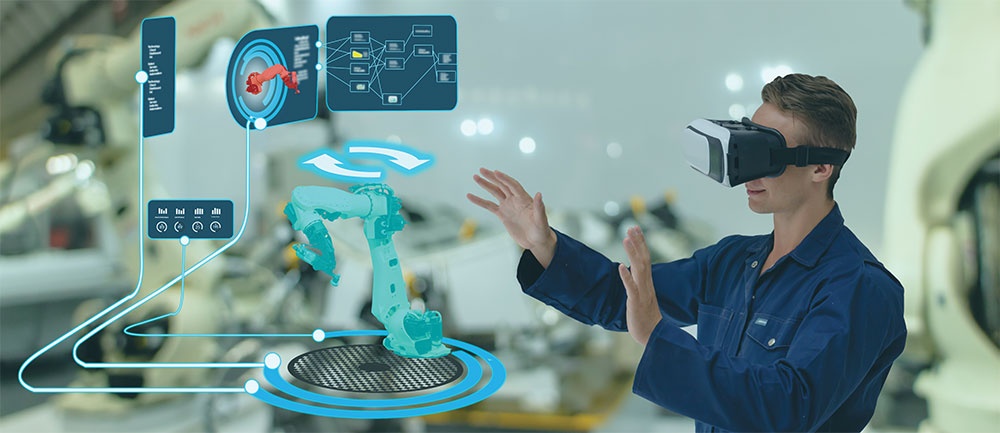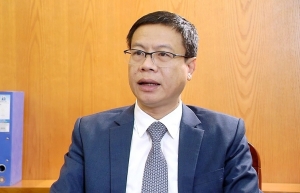Sci-tech innovations at heart of green goals
Having worked with Vietnam National University (VNU) for a few years to develop and apply new technologies for shrimp farming, Nam Mien Trung Group has posted some remarkable results.
“Productivity has been increasing since applying high technologies in biology, genetics, water treatment, and monitoring. Most of the farming process has been digitalised or innovated remarkably,” said Dang Quoc Tuan, vice chairman of Nam Mien Trung Group.
The group has poured plenty into biotechnologies and genetics in order to find out the strongest and highest-yielding shrimp varieties to enhance productivity, as well as paid more attention to water treatment technologies, microbial products, and monitoring factors like temperature and salinity by a sensor and reporting on a smartphone.
They contribute to saving labour and feed coefficient, reducing pond environmental pollution, limiting diseases, increasing resistance, and enhancing quality and productivity.
“Over the last five years, applying sci-tech to farming is a trend that every player is following up, and foreign players are benefiting thanks to the support and tech transfer from parent companies overseas. Investing in this and cooperating with local research and development (R&D) facilities are the best solutions right now,” added Tuan.
 |
| Vietnam is hoping to push ahead in sci-tech development with funding becoming more accessible, Photo: Shutterstock |
Efforts for innovation
Sci-tech and innovation are not confined to high-tech parks, large firms, or international corporations. Cooperation between scientists and grassroots innovators is equally important to promote needs-based instead of paper-based research. Many grassroots innovators provide low-income people with solutions to overcome their problems and improve their livelihoods.
Examples include Minh Hong Biotech, adopting a circular economy business model to turn hundreds of tonnes of waste into home cleansing products and create jobs for more than 400 women; Ta Dinh Huy with multifunctional agricultural machinery; Pham Van Hat with automatic seeding machines; and Le Van Thanh with an invention to help farmers separate corn kernels in mountainous areas.
In recent years, Vietnam has made tremendous progress in developing its innovation, science, and technology markets. According to the Global Innovation Index 2022 published by the World Intellectual Property Organization, Vietnam ranks second among lower middle-income countries and 48th among 132 economies globally. The report recognises Vietnam’s achievements in market and business sophistication, knowledge and technology outputs, and creative innovations.
Experts said that as Vietnam continues to progress, it must go beyond adopting existing technologies and invest more proactively in R&D to build new technologies. Currently, Vietnam’s public and private investment in sci-tech is relatively low compared to the global average. At less than half a percentage of GDP, investment rates are almost five times lower than the average sci-tech investment rate of 2.23 per cent.
“We live in an age of volatility, uncertainty, complexity, and ambiguity, which presents a set of unprecedented challenges,” said Tran Huong Giang, head of the UN Development Programme’s Experimentation Accelerator Lab.
Directed well, science and technology can help to solve some of these disruptions. For example, advances in renewable energy technologies have driven down costs and will help break dependence on fossil fuels. And agricultural technologies help to produce food more cheaply and with less impact on the natural environment. These advances are all thanks to breakthroughs in sci-tech.
“To increase the contribution of this in sustainable growth, private capital and blended finance investments will be important,” said Pham Bao Son, vice president of the VNU. “And although Vietnam has the prevailing regulatory framework for private investment in these areas, such as the Law of Science and Technology, decrees on investment in innovative startups, and others, there are barriers that discourage private investors from making sizeable investments.”
Sustainable actions
At last week’s seminar on attracting private investment in sci-tech and innovation development in Vietnam, towards sustainable development goals, Rajiv Lall, who is an advisor at the Centre for Impact Investing and Practices, highlighted two examples of companies that have combined innovation with that delivery or impact.
“One Indonesian e-fisheries business aggregates the cash of fishing communities across the country and uses a digital auction platform to facilitate direct and fair trade between fishermen and buyers. It connects more efficiently to international markets,” Lall said.
Founded in 2016, it already has 26,000 fishermen across 20 provinces and fishermen have achieved increases of up to 12-fold in their incomes, and it has generated thousands of jobs. The company has also managed to attract $65 million of investment both from domestic and foreign investors, including from the Netherlands and the US.
The next example is a company in the healthcare space. “It’s a digital platform that seeks to improve access to affordable medicine and provide information to pharmacists to improve the quality of patient care or the cost of these areas,” Lall explained. “The application is home to the largest community of pharmacy professionals across Southeast Asia, connecting up to 35,000 professionals across more than 45,000 policies in Indonesia, the Philippines, Vietnam, Malaysia, Thailand, and Cambodia.”
The company has achieved this by attracting $30 million of investment, much of it from the US and the United Kingdom.
In Vietnam, the government has made it clear that the private sector is to be an important catalyst for economic development. And the government’s recent strategy for scientific and technological development and innovation lays out how the private sector can participate in Vietnam to drive a wide modernisation and innovation.
“Recent policy initiatives in investment all go in the right direction from our own experience across the region. We find one thing, in particular, has been very useful for catalysing innovation that pays particular attention to facilitating the role of private equity and venture capital,” Lall added.
“We believe it will be a compelling tool for getting now to attract targeted investors that not only will deliver innovation but will also deliver high social impact for the communities in Vietnam, as the two aforementioned cases.”
At the VNU, although there has been a marked increase in research quality, quantity and scale, the potential for cooperation with its partners is being implemented too small. Policies are needed to further promote this cooperation.
“Research and application for socioeconomic development need orders from businesses because they understand the market needs best. While resources from public investment for R&D are going down, resources from the private sector are huge,” Son from VNU said.
He hopes for bottlenecks to be removed soon in order to unlock resources of universities for sci-tech and innovation.
“If the conditions are not yet ripe to issue formal regulations, the state should allow piloting some policies,” he said.
| Tran Van Tung-Deputy Minister of Science and Technology | |
Science, technology and innovation activities in the country have made great progress and achieved important achievements in many fields, especially processing, wood products, seafood, and telecommunications and IT. The results of sci-tech R&D are quickly applied in many fields of production, business, and life, affirming the important role of sci-tech in the task of improving national competitiveness, gradually reducing dependence on traditional economic activities, transforming the growth model to one based on the strong application of science, technology, and innovation. In 2021, the Ministry of Science and Technologies submitted about 20 documents to the government and prime minister for approval to develop a startup ecosystem, innovation, and sci-tech market, as well as improve enterprises’ capacity to absorb, manage, and innovate technologies, and encourage large-sized businesses to pour in high technologies. However, at present, sci-tech has not really become a key driving force for socioeconomic development. Such funds as the National Science and Technology Development Fund, the National Technology Innovation Fund, and the Science and Technology Development Fund of enterprises that have been put into operation have initially affirmed their effectiveness, but in general, investment in this area is still limited, not as high as expected. Amid the exciting developments of Industry 4.0, we are facing many opportunities and challenges. For rapid and sustainable development, Vietnam should mobilise the total resources of both the budget and private resources to invest to create a new growth engine for the economy. Private investment in this area has been recently increasing versus public investment and the regulatory framework is being strengthened. However, the number of businesses investing in R&D is relatively low and the usage of related funds within businesses is modest. Unlocking private investment in sci-tech and innovation development towards sustainable development goals is vital to boost socioeconomic development in Vietnam. |
 | Special policies to attract investment in sci-tech The Ministry of Science and Technology is drafting policies and working out the kinks in the newest public-private partnership mechanism to encourage investment in science and technology. Deputy Minister Le Xuan Dinh talked with Bich Thuy the special mechanisms for investment attraction that will be made available soon. |
What the stars mean:
★ Poor ★ ★ Promising ★★★ Good ★★★★ Very good ★★★★★ Exceptional
Themes: Digital Transformation
- PM sets five key tasks to accelerate sci-tech development
- Ho Chi Minh City launches plan for innovation and digital transformation
- Dassault Systèmes and Nvidia to build platform powering virtual twins
- Sci-tech sector sees January revenue growth of 23 per cent
- Advanced semiconductor testing and packaging plant to become operational in 2027
Related Contents
Latest News
More News
- Ho Chi Minh City launches plan for innovation and digital transformation (February 25, 2026 | 09:00)
- Vietnam sets ambitious dairy growth targets (February 24, 2026 | 18:00)
- Masan Consumer names new deputy CEO to drive foods and beverages growth (February 23, 2026 | 20:52)
- Myriad risks ahead, but ones Vietnam can confront (February 20, 2026 | 15:02)
- Vietnam making the leap into AI and semiconductors (February 20, 2026 | 09:37)
- Funding must be activated for semiconductor success (February 20, 2026 | 09:20)
- Resilience as new benchmark for smarter infrastructure (February 19, 2026 | 20:35)
- A golden time to shine within ASEAN (February 19, 2026 | 20:22)
- Vietnam’s pivotal year for advancing sustainability (February 19, 2026 | 08:44)
- Strengthening the core role of industry and trade (February 19, 2026 | 08:35)


 Tag:
Tag:




















 Mobile Version
Mobile Version